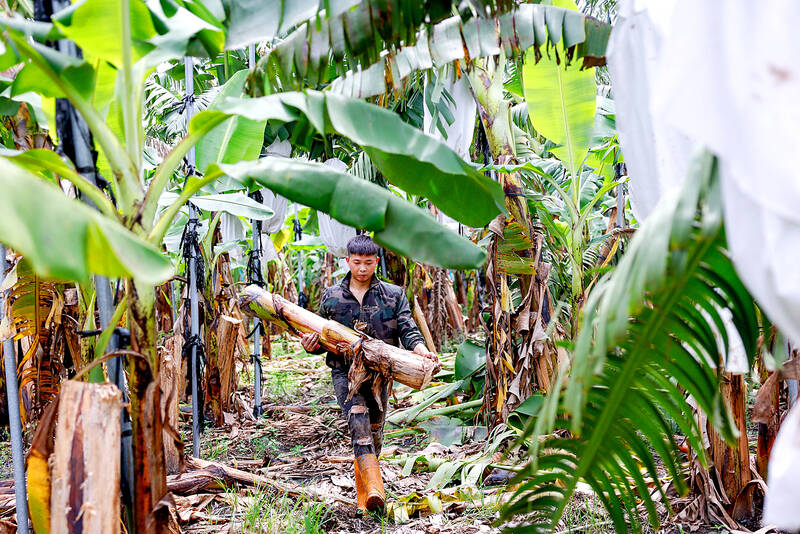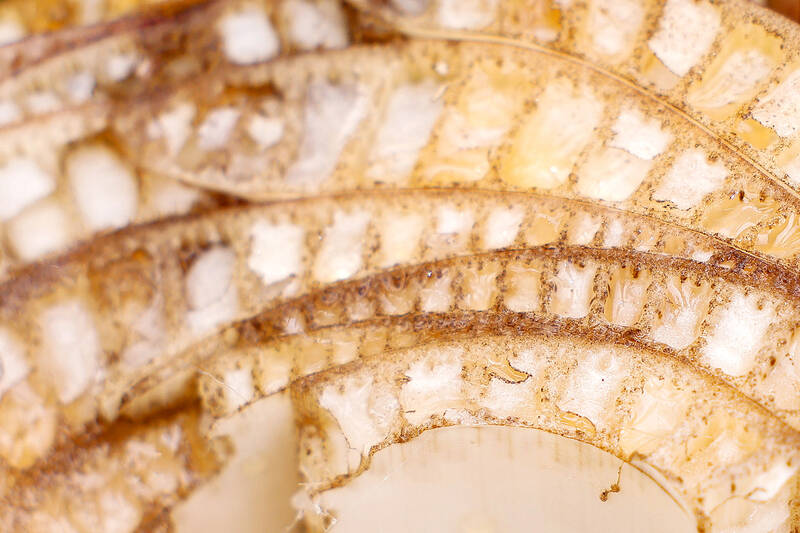Entrepreneur Nelson Yang (楊富翔) is reaching back into Taiwan’s history to turn the humble banana plant into an unlikely sustainable textile.
Taiwan is now the world’s dominant producer of advanced semiconductors, but the yellow fruit, still widely grown in the nation, was once a source of patriotic pride.
Yang’s Farm to Material, headquartered in the central rural belt in Changhua County, is turning banana fiber into textiles he hopes would one day supply global sneaker brands.

Photo: Ann Wang, Reuters
“Back in 2008, European [sneaker] brands told us that they were hoping to find a way for food and materials to be produced in parallel, meaning that food and materials are yielded from the same land,” he said. “So we’ve been working based on that concept. What we’re doing now is making sure that all our material sources come from food or leftovers from agriculture or the food industry. We then transform those leftovers into usable materials.”
Under Japanese colonial rule from 1895 to 1945, Taiwan was renowned for its fruit, especially pineapples and bananas.
In the 1960s, the nation branded itself the “banana kingdom” to boost exports, now long since overtaken by the technology industry.

Photo: Ann Wang, Reuters
Yang’s company takes the middle section of the banana plant, known as the pseudostem and normally abandoned in the field after harvest, then crushes and dries it to produce the fibers that can make clothing.
Some of the fibers are turned into yarn that can be blended with cotton for socks and can also be turned into vegan “leather.”
The business is still in its infancy with no orders from apparel companies.
“Banana fiber actually performs better than regular cotton in terms of water consumption, absorbency and supply stability, making it highly promising for future applications,” said Charlotte Chiang (江夏碧), director of the innovation and sustainable design department at the Taiwan Textile Federation.
“Banana fiber could become a new highlight for Taiwan in the field of biomass fiber in the textiles industry,” she said.

Taiwanese scientists have engineered plants that can capture about 50 percent more carbon dioxide and produce more than twice as many seeds as unmodified plants, a breakthrough they hope could one day help mitigate global warming and grow more food staples such as rice. If applied to major food crops, the new system could cut carbon emissions and raise yields “without additional equipment or labor costs,” Academia Sinica researcher and lead author the study Lu Kuan-jen (呂冠箴) said. Academia Sinica president James Liao (廖俊智) said that as humans emit 9.6 billion tonnes of carbon dioxide compared with the 220 billion tonnes absorbed

The Taipei Mass Rapid Transit (MRT) Wanda-Zhonghe Line is 81.7 percent complete, with public opening targeted for the end of 2027, New Taipei City Mayor Hou You-yi (侯友宜) said today. Surrounding roads are to be open to the public by the end of next year, Hou said during an inspection of construction progress. The 9.5km line, featuring nine underground stations and one depot, is expected to connect Chiang Kai-shek Memorial Hall Station to Chukuang Station in New Taipei City’s Jhonghe District (中和). All 18 tunnels for the line are complete, while the main structures of the stations and depot are mostly finished, he

Taipei is to implement widespread road closures around Taipei 101 on Friday to make way for large crowds during the Double Ten National Day celebration, the Taipei Department of Transportation said. A four-minute fireworks display is to be launched from the skyscraper, along with a performance by 500 drones flying in formation above the nearby Nanshan A21 site, starting at 10pm. Vehicle restrictions would occur in phases, they said. From 5pm to 9pm, inner lanes of Songshou Road between Taipei City Hall and Taipei 101 are to be closed, with only the outer lanes remaining open. Between 9pm and 9:40pm, the section is

China’s plan to deploy a new hypersonic ballistic missile at a Chinese People’s Liberation Army Rocket Force (PLARF) base near Taiwan likely targets US airbases and ships in the western Pacific, but it would also present new threats to Taiwan, defense experts said. The New York Times — citing a US Department of Defense report from last year on China’s military power — on Monday reported in an article titled “The missiles threatening Taiwan” that China has stockpiled 3,500 missiles, 1.5 times more than four years earlier. Although it is unclear how many of those missiles were targeting Taiwan, the newspaper reported